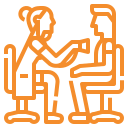Primary Care
Family medicine is a specialized branch of medical practice that focuses on providing comprehensive healthcare services to individuals of all ages, from infants to seniors, and often extends care to the entire family unit. Family health providers, also known as primary care providers or general practitioners, are dedicated to addressing a wide range of medical needs and promoting overall well-being. Here are some key aspects of family medicine:


Holistic Care:
Family medicine takes a holistic approach to healthcare, considering not only the physical health but also the emotional, social, and psychological aspects of patients’ lives. This approach emphasizes the importance of preventive care and lifestyle factors in maintaining health.


Long-Term Relationships:
Family health providers build long-term relationships with their patients, which enables them to better understand each individual’s unique medical history, needs, and family dynamics. This continuity of care contributes to more personalized and effective treatment.


Primary and Preventive Care:
Family health providers serve as the first point of contact for many healthcare needs. They provide routine check-ups, vaccinations, screenings, and health education to prevent illnesses and promote well-being.


Diagnosis and Treatment:
Family health providers diagnose and treat a wide array of acute and chronic medical conditions, ranging from minor illnesses to complex health issues. They are skilled in managing a broad spectrum of medical concerns and often collaborate with specialists when necessary.


Coordination of Care:
Family health providers coordinate care across various healthcare settings, ensuring that their patients receive appropriate referrals and follow-up care. They help manage chronic conditions, medications, and referrals to specialists.


Community Health Advocacy:
Family health providers often play a vital role in their communities by advocating for public health initiatives, health education, and preventive measures to address local health issues.


Patient-Centered Approach:
Family medicine places a strong emphasis on patient involvement in decision-making and self-care. Family physicians work with patients to set health goals and empower them to make informed choices about their well-being.


Flexibility:
Family medicine is adaptable and versatile, addressing the evolving healthcare needs of individuals and families throughout their lifetimes. Family health providers can provide care across a wide range of medical specialties.
Family medicine is crucial in ensuring accessible, continuous, and comprehensive healthcare for patients and their families. These dedicated healthcare professionals are essential in promoting the health and wellness of communities by offering personalized, patient-centered care that encompasses the full spectrum of medical needs.
